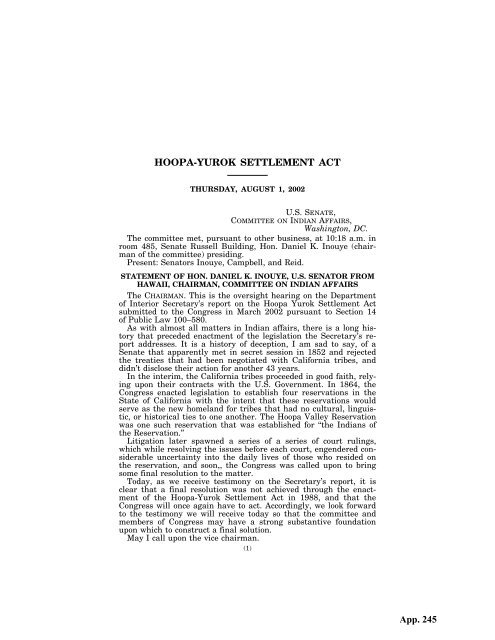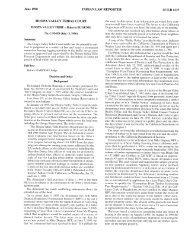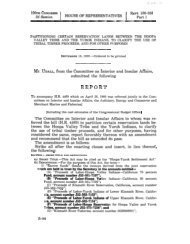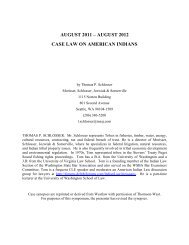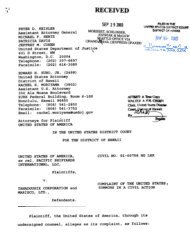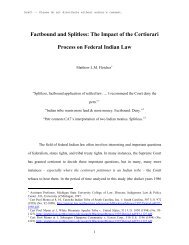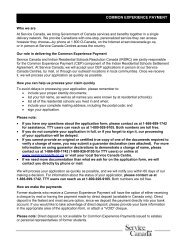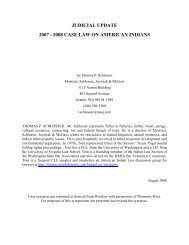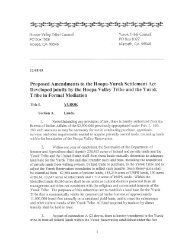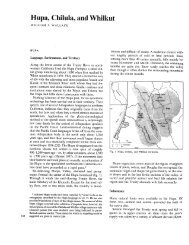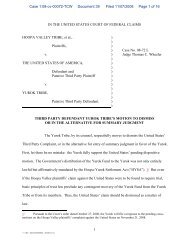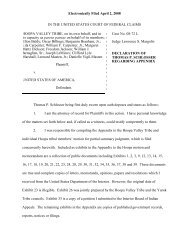Hoopa appendix supporting summary judgment - Schlosser Law Files
Hoopa appendix supporting summary judgment - Schlosser Law Files
Hoopa appendix supporting summary judgment - Schlosser Law Files
You also want an ePaper? Increase the reach of your titles
YUMPU automatically turns print PDFs into web optimized ePapers that Google loves.
HOOPA-YUROK SETTLEMENT ACT<br />
THURSDAY, AUGUST 1, 2002<br />
U.S. SENATE,<br />
COMMITTEE ON INDIAN AFFAIRS,<br />
Washington, DC.<br />
The committee met, pursuant to other business, at 10:18 a.m. in<br />
room 485, Senate Russell Building, Hon. Daniel K. Inouye (chairman<br />
of the committee) presiding.<br />
Present: Senators Inouye, Campbell, and Reid.<br />
STATEMENT OF HON. DANIEL K. INOUYE, U.S. SENATOR FROM<br />
HAWAII, CHAIRMAN, COMMITTEE ON INDIAN AFFAIRS<br />
The CHAIRMAN. This is the oversight hearing on the Department<br />
of Interior Secretary’s report on the <strong>Hoopa</strong> Yurok Settlement Act<br />
submitted to the Congress in March 2002 pursuant to Section 14<br />
of Public <strong>Law</strong> 100–580.<br />
As with almost all matters in Indian affairs, there is a long history<br />
that preceded enactment of the legislation the Secretary’s report<br />
addresses. It is a history of deception, I am sad to say, of a<br />
Senate that apparently met in secret session in 1852 and rejected<br />
the treaties that had been negotiated with California tribes, and<br />
didn’t disclose their action for another 43 years.<br />
In the interim, the California tribes proceeded in good faith, relying<br />
upon their contracts with the U.S. Government. In 1864, the<br />
Congress enacted legislation to establish four reservations in the<br />
State of California with the intent that these reservations would<br />
serve as the new homeland for tribes that had no cultural, linguistic,<br />
or historical ties to one another. The <strong>Hoopa</strong> Valley Reservation<br />
was one such reservation that was established for ‘‘the Indians of<br />
the Reservation.’’<br />
Litigation later spawned a series of a series of court rulings,<br />
which while resolving the issues before each court, engendered considerable<br />
uncertainty into the daily lives of those who resided on<br />
the reservation, and soon,, the Congress was called upon to bring<br />
some final resolution to the matter.<br />
Today, as we receive testimony on the Secretary’s report, it is<br />
clear that a final resolution was not achieved through the enactment<br />
of the <strong>Hoopa</strong>-Yurok Settlement Act in 1988, and that the<br />
Congress will once again have to act. Accordingly, we look forward<br />
to the testimony we will receive today so that the committee and<br />
members of Congress may have a strong substantive foundation<br />
upon which to construct a final solution.<br />
May I call upon the vice chairman.<br />
(1)


